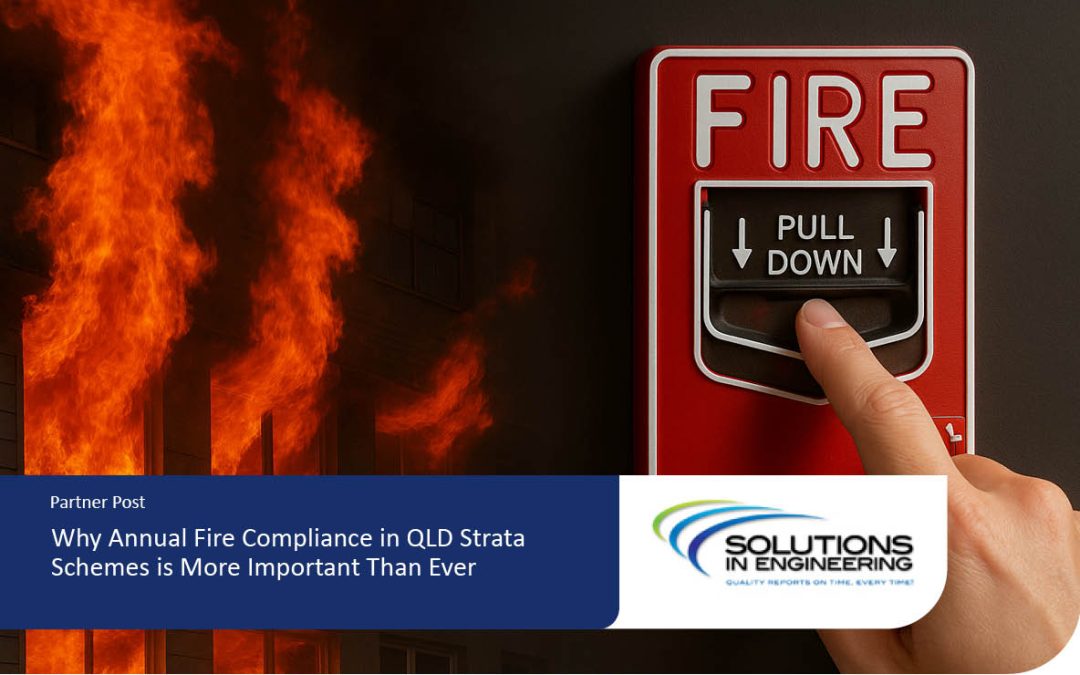Living in a body corporate in Queensland means sharing responsibility for the safety of all residents, particularly when it comes to fire emergencies. A key part of this responsibility is meeting annual fire safety compliance obligations. With modern construction materials and everyday household products causing fires to ignite and spread more rapidly than in the past, compliance has become more critical than ever.
Fire Compliance Obligations in Queensland Strata
Under the Fire Services Act 1990 and the Building Fire Safety Regulation 2008, bodies corporate and individual lot owners must ensure their buildings are prepared for a fire or hazardous materials emergency. These responsibilities are shared collectively through the body corporate.
Key responsibilities include:
• Maintaining fire safety installations.
• Preparing and annually reviewing a Fire & Evacuation Plan.
• Keeping all evacuation routes clear.
• Appointing and training Fire Wardens.
• Conducting an annual evacuation practice.
• Submitting an Annual Occupier’s Statement.
• Keeping accurate compliance records.
Higher-risk buildings, those with greater occupancy, must also appoint a qualified Fire Safety Adviser (FSA) to oversee compliance and provide expert guidance.
What Happens If You Don’t Comply
Non-compliance can lead to:
• Significant fines for the body corporate and sometimes individuals.
• Insurance problems, including reduced coverage or policy cancellation.
• Increased liability, where committees and owners may be held responsible if poor systems contribute to injury or loss.
Beyond the legal and financial repercussions, failure to comply directly increases the risk to lives and property.
Why Evacuation Times Are Shorter in Modern Buildings
Many new apartment complexes use advanced, lightweight construction materials. While these provide design flexibility and energy efficiency, they also increase risk:
• Faster ignition and fire spread – certain materials burn more rapidly than brick or concrete.
• Increased smoke production – toxic smoke can fill corridors and stairwells within minutes.
• Higher fuel loads – synthetic furnishings and fittings release heat and gases at dangerous rates.
In practice, this means a modern apartment can become uninhabitable in under five minutes after a fire starts. In contrast, older masonry buildings often allowed 15–20 minutes before conditions became deadly.
Why Every Owner Should Care
Even if you’re not on the committee, fire safety directly affects you, your family, and your investment. You can help by:
• Participating in fire evacuation practices and knowing your evacuation route.
• Reporting damaged or missing fire safety equipment.
• Supporting the body corporate in budgeting for annual fire safety audits and necessary obligations.
The Bottom Line
With modern building designs, every second counts during a fire. Annual fire compliance ensures your building’s systems are ready to give you those vital extra moments to escape. In Queensland’s strata environment, it’s not just about following the law – it’s about protecting lives.
If you’re unsure about your building’s current compliance status, speak to Solutions in Engineering today. A well-maintained fire safety system could be the difference between a safe evacuation and a tragedy.
